Thirteen Days Blu-ray Movie
HomeThirteen Days Blu-ray Movie 
Warner Bros. | 2000 | 146 min | Rated PG-13 | Nov 12, 2013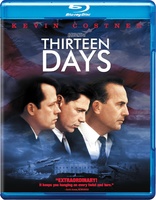
Movie rating
7.4 | / 10 |
Blu-ray rating
| Users | 0.0 | |
| Reviewer | 4.5 | |
| Overall | 4.5 |
Overview
Thirteen Days (2000)
For thirteen days in October of 1962, the world stood on the brink of an unthinkable catastrophe. A nuclear exchange between the United States and the Soviet Union.
Starring: Kevin Costner, Bruce Greenwood, Steven Culp, Dylan Baker, Michael FairmanDirector: Roger Donaldson
| History | Uncertain |
| Thriller | Uncertain |
| Drama | Uncertain |
Specifications
Video
Video codec: MPEG-4 AVC
Video resolution: 1080p
Aspect ratio: 1.78:1
Original aspect ratio: 1.85:1
Audio
English: DTS-HD Master Audio 5.1 (48kHz, 24-bit)
Subtitles
English SDH, Spanish
Discs
50GB Blu-ray Disc
Single disc (1 BD)
Playback
Region free
Review
Rating summary
| Movie | 4.5 | |
| Video | 4.5 | |
| Audio | 4.0 | |
| Extras | 4.0 | |
| Overall | 4.5 |
Thirteen Days Blu-ray Movie Review
No Fail-Safe
Reviewed by Michael Reuben November 13, 2013Most thrillers are artificial constructions, but Thirteen Days is different. With the caveat that no historical account can ever be definitive, Roger Donaldson's 2000 depiction of the Cuban Missile Crisis has the distinction of being a true-life nailbiter, even though we know the outcome. For a brief period in October 1962, the United States and the Soviet Union perched on the brink of nuclear war. At the White House and the Pentagon, a dedicated group of military commanders, diplomats and politicians argued passionately, sometimes even violently, over how best to protect the nation. Their expertise was considerable, and their devotion to country beyond doubt, but they were facing an enemy whose tactics were unclear and whose motives were uncertain—and the consequences of a mistake were unthinkable. Although the title Thirteen Days comes from a memoir written by Robert Kennedy, who was Attorney General at the time, the main source for David Self's complex script is the 1997 volume The Kennedy Tapes: Inside the Kennedy White House During the Cuban Missile Crisis, edited by historians Ernest R. May and Philip D. Zelikow. May and Zelikow revealed newly declassified tapes, many of them made by President Kennedy himself without the knowledge of those present. The tapes captured heated and sometimes frenzied deliberations as the crisis unfolded. Self had access to other new material, including a five-hour interview by journalist Sander Vanocur with Kenny O'Donnell, a friend of both Kennedy brothers since college and the President's special advisor on political affairs. As noted in the extras, O'Donnell was considered one of the most powerful men in the Kennedy Administration, because of his control over access to the President. Self's decision to make O'Donnell the protagonist of Thirteen Days became controversial, especially among surviving participants like former Defense Secretary Robert McNamara, who objected that O'Donnell was never a key player in the Cuban Missile Crisis. But Thirteen Days doesn't try to make him one, even if he is played by Kevin Costner. For the most part, O'Donnell remains on the sidelines, a witness to history but a bystander as it unfolds. Because of their long-time friendship, he can speak to Jack and Bobby Kennedy with a familiarity that others wouldn't dare to assume; indeed, when we first see O'Donnell with the President, he casually filches the Commander in Chief's morning toast off his plate, without apology, like a college roommate. In a room full of colliding agendas and barely suppressed animosities, O'Donnell is often the only person the Kennedys trust, because of their shared history. His position makes him the ideal guide to steer the audience through the maze of policies and personalities.
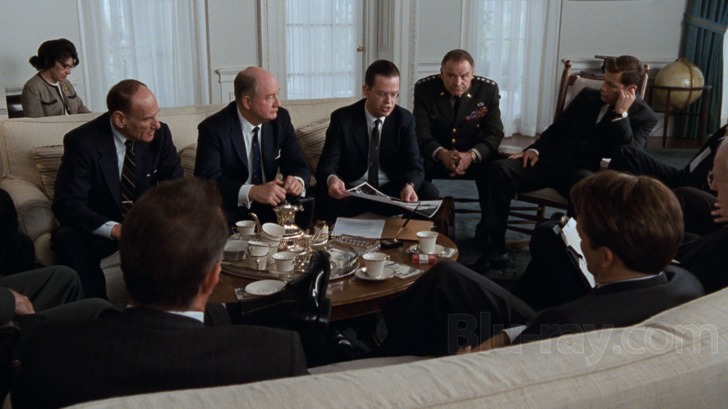
Donaldson opens Thirteen Days with authentic footage from nuclear tests in order to establish the stakes in everything that follows. Then, with the help of ace editor Conrad Buff (Titanic), whom Donaldson repeatedly acknowledges in his commentary, he begins the elaborate interweaving of parallel events that makes Thirteen Days play like a Tom Clancy thriller. At his suburban home, Kenny O'Donnell (Costner) awakens on October 14, 1962, has breakfast with his wife (Lucinda Jenney) and five kids and reports to the White House, where he is preoccupied with the congressional midterm elections. In a brief but pivotal scene that helps illustrate O'Donnell's relationship with the Kennedys, he spars with Jackie (Stephanie Romanov) over the guest list to a fundraiser. Meanwhile, a U-2 spy flight over Cuba takes aerial photographs, and the film is developed. When the analysts peer at the images, they identify Soviet medium-range nuclear missile sites under construction. Once operational, the missiles would be able to destroy the entire Eastern United States, five minutes after launch. (Later flights will reveal the presence of long-range missiles capable of reaching the entire country.) The next week is consumed with debate. The military, represented by Gen. Maxwell Taylor, Chairman of the Joint Chiefs (Bill Smitrovich), and Gen. Curtis LeMay, Chief of Staff of the USAF and creator of the Strategic Air Command (Kevin Conway), strongly advocate an aerial bombardment followed by a full-scale invasion. From their point of view, this is a simple question of repelling an invader, and time is of the essence, lest the missiles become operational. President Kennedy (Bruce Greenwood) and Bobby Kennedy (Steven Culp) worry about the Russian response, which they expect will occur elsewhere in the world, probably Berlin. What will the U.S. do when the Soviets attack an ally we have sworn to protect? Kennedy cites The Guns of August, the famous account of how World War I grew out of a cascade of smaller conflicts that accelerated beyond the ability of the participants to control or stop them. Underlying the tension is a barely repressed distrust between the administration and the military left over from the failed Bay of Pigs invasion of Cuba the previous year. The military blames the administration for inadequate support, while the administration blames the military for poor planning and bad information. Neither side trusts the other. Arrayed between these reluctant partners is an assortment of advisors occupying a wide spectrum of views, from former Secretary of State Dean Acheson (Len Cariou), an original Cold Warrior and respected hardliner, to the icily analytical CIA Director, John McCone (Peter White), to U.N. Ambassador Adlai Stevenson (Michael Fairman), who is brave enough to propose negotiating with the Soviets even though he knows he'll be branded an appeaser. In the clinch, though, it is Stevenson who becomes the public image of U.S. fortitude during a televised confrontation with the Soviet U.N. Ambassador—one of the few moments in the crisis that is played out publicly—when Stevenson demands that the Soviet Union acknowledge its missiles in Cuba and, in a famous moment, says he is prepared to wait for his answer "until hell freezes over!" After much debate, during which the President maintains his schedule of campaign stops to create an appearance of normalcy, the decision is made to throw a naval blockade around Cuba. On October 22, Kennedy addresses the nation, and for the first time the public learns of the threat. (Anyone old enough to have experienced these events will have their own distinctive memories.) The blockade, or "quarantine", as it was called, is less aggressive than bombardment or invasion, but it carries its own risks. This becomes clear when the first group of Soviet ships approaches the perimeter, accompanied by a submarine, and the President orders the captain of the lead battleship to force the sub to the surface. An even more dire predicament involving a Soviet freighter results in a screaming confrontation between Secretary of Defense Robert McNamara (Dylan Baker) and Admiral George Anderson (Madison Mason) over the appropriate response. (The incident is well documented, although the accounts are all different.) Neither man is wrong. The problem is that they're conducting an operation without precedent against an enemy whose goal they don't fully understand. The crisis is eventually resolved on October 28, 1962, through a process so convoluted and improbable that, if someone invented it for a screenplay, it would be rejected as beyond credibility. It begins with a "back channel" approach through an ABC News reporter, John Scali (Jack Blessing), by a likely Soviet spy, Aleksandr Fomin (Boris Lee Krutonog). These meetings are followed by multiple, and conflicting, communications from Moscow, which result in speculation that Krushchev has been deposed. Eventually, Bobby Kennedy and Soviet Ambassador Anatoly Dobrynin (Elya Baskin) meet, without any certainty on the American side that they were talking to someone with authority to deal. While all this is happening, the public waits fearfully, and the military prepares for the worst. Thirteen Days is not the last word on the Cuban Missile Crisis, nor could it be, because the structure of a thriller requires a conclusion, but history is open-ended. Like any major historical event, the Cuban Missile Crisis, its aftermath and the actions of those involved will continue to be reinterpreted, both through the lens of subsequent generations and as further information is discovered. For example, there is strong evidence that the Soviets responded to their Cuban "defeat" by embarking on an intensive campaign of nuclear weapons development, thereby intensifying, rather than defusing, the danger to the U.S. and the world. And various elements in the U.S. defense community grew overconfident in the aftermath of Cuba, as suggested by the comment of CIA Director McCone that now we can "run the table" on Krushchev and the communists—an attitude that ill served the country in the coming years in Southeast Asia. What Thirteen Days does offer is the uniquely visceral thrill of watching talented and powerful individuals struggle with impossible choices that must be made, because the fate of humanity hangs in the balance—and this was no comic book.
Thirteen Days Blu-ray Movie, Video Quality 
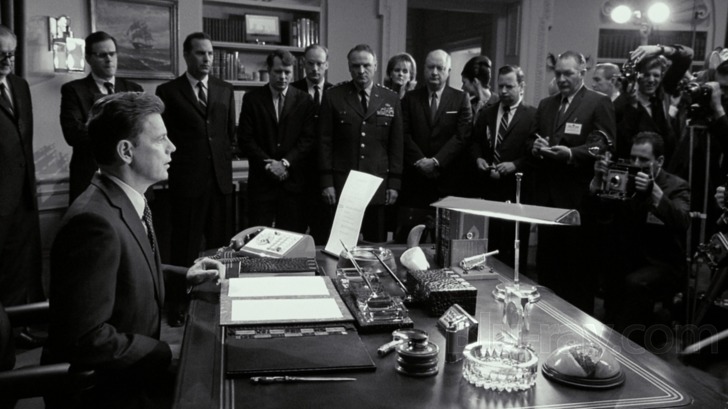
Thirteen Days was the third feature that Donaldson shot with cinematographer Andrzej Bartkowiak (the other two being Species and Dante's Peak), but it was the first to be finished on what was then the newly developed process of a digital intermediate. Both software and colorists were in the early stages then, and a few bad habits had carried over from DVD transfers, so that it is possible to detect occasional light (very light) sharpening in some scenes, if one is looking for it. Don't look, and you'll probably never see it. Since this was almost certainly "baked into" the release and seen in theaters, the Blu-ray is not at fault. Otherwise, Warner's 1080p, AVC-encoded Blu-ray is a superior presentation of Thirteen Days, with a sharply detailed picture (especially noticeable in large crowds like the U.N.), richly textured surfaces and a palette favoring the dark blues and grays of the business suits worn by the President and his staff—varied occasionally by a side-trip to the light blue Caribbean water where the blockade is in progress, or to the green Cuban jungles (shot in the Philippines) where the missiles are being assembled, or even to Kenny O'Donnell's son's football practice where he goes to say goodbye in case the worst happens. Blacks are solid and deep, which is essential for those moments when Donaldson fades the image to black-and-white to present a reminder of the time period or reproduce an iconic moment lifted from the pages of Life magazine. Warner has provided its usual "best" average bitrate of 25.96 Mbps, although there is ample space on the disc to have allowed a more expansive rate and less compression. Still, no artifacts were observed.
Thirteen Days Blu-ray Movie, Audio Quality 
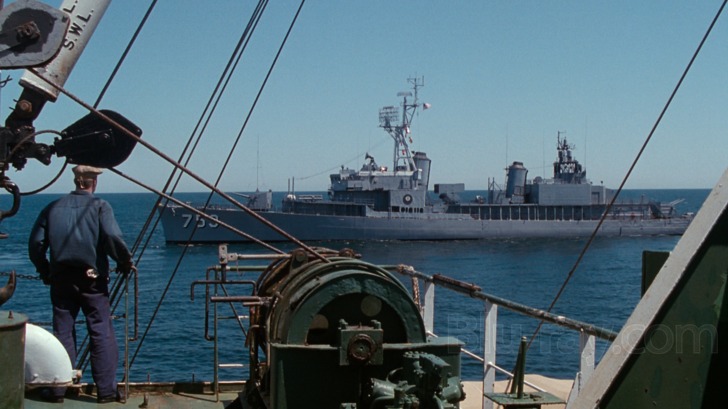
The 5.1 mix for Thirteen Days, presented here in lossless DTS-HD MA, does an effective job in the film's few big action sequences, notably the low-level reconnaissance flyover of Cuba, the two sequences featuring high-altitude U-2 spy planes and the scenes depicting the blockade (only one of which involves any artillery fire). Otherwise, the track's mix is a subtle one that attempts to suggest the constant hum of activity at the White House, the Pentagon and other places where the drama unfolds. A few major crowd scenes, notably the U.N. and a political rally with Mayor Richard J. Daley in Chicago, provide an immersive sense of the political world, as do the popping flashbulbs of the press. The dialogue is generally clear, even with Costner's bad Boston accent, which was mercilessly mocked by all and sundry. The score by Trevor Jones (The Last of the Mohicans) has the same foreboding quality that Hans Zimmer brought to another nuclear thriller, Crimson Tide, but it is more understated and unnerving.
Thirteen Days Blu-ray Movie, Special Features and Extras 
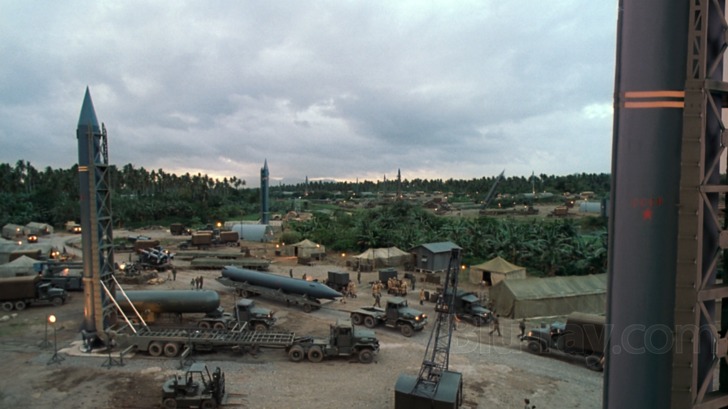
The extras have been ported over from New Line Cinema's 2001 "InfiniFilm" DVD edition of Thirteen Days, although no attempt has been made to replicate the InfiniFilm series' interactive viewing experience. Such an effort would have required extensive BD-Java encoding, which is a rarity on Warner Blu-rays, and, in my opinion, we are better off without it. Not included are the DVD-ROM features, which included the script and various online features (which may no longer be available).
- Commentaries
- Filmmaker Commentary with Director Roger Donaldson, Producer and Actor Kevin Costner, Writer David Self, Executive Producer Michael De Luca, Producer Armyan Bernstein and Visual Effects Supervisor Micheal McAlister: It appears that most of the commentators were recorded in a group, with a few comments from Costner recorded separately and edited into the mix. The commentary was recorded shortly before the film's premiere. The discussion is equally divided between the film's historical roots and its technical challenges, and it is informative on both fronts.
- Historical Figures Commentary with Archival Audio of John F. Kennedy, Kenneth O'Donnell and Robert McNamara, plus Interviews with Sergei Kruschchev, Pierre Salinger, Historians Ernest R. May and Philip Zelikow and Others: Among the many additional participants are Dino A. Brugioni, author of Eyeball to Eyeball: The Inside Story of the Cuban Missile Crisis, and the various journalists who appear in the "Roots of the Cuban Missile Crisis" documentary. An unidentified narrator sometimes (but not always) identifies the speaker. This is an intriguing but frustrating collection of excerpts, because ultimately one would like to hear the full interviews. The sections from Kenny O'Donnell's interview, which is elsewhere described as lasting five hours, are tantalizing but far too brief. The comments from Sergei Krushchev, like many of his contributions to the documentary, are interesting but bear further examination (e.g., his observation that Adlai Stevenson's televised showdown with the Russian ambassador to the U.N. had no impact in Moscow). The journalists' stories are often colorful and entertaining but do little to illuminate the course of events, because journalists were largely kept out of the loop.
- Historical Information Track: This is a subtitle track providing background information on the technology, geopolitics and historical figures of the era. On the DVD, the track also provided links to relevant items in the extras which could be played at that point in the film, if one did not mind breaking up the viewing experience. The linking feature has not been reproduced on the Blu-ray.
- Historical Figures Biographies (480i; 1.78:1): These brief sketches of the various figures in the drama aren't so much biographies as impressions by people who knew them.
- Leader: John F. Kennedy (1:52)
- Leader: Nikita Krushchev (2:38)
- Leader: Fidel Castro (2:08)
- Advisor: Robert Kennedy (1:42)
- Advisor: Kenneth O'Donnell (0:53)
- Advisor: Dean Acheson (1:17)
- Advisor: McGeorge Bundy (1:43)
- Advisor: Robert McNamara (2:11)
- Advisor: John McCone (1:21)
- Advisor: Theodore Sorenson (0:52)
- Advisor: Dean Rusk (1:39)
- Military: General Maxwell Taylor (1:51)
- Military: General Curtis LeMay (2:10)
- Diplomat: Adlai Stevenson (2:20)
- Diplomat: Anatoly Dobrynin (1:25)
- Press: John Scali (1:22)
- Press: Pierre Salinger (1:11)
- Roots of the Cuban Missile Crisis (480i; 1.78:1, enhanced; 48:46): This detailed documentary traces the history of the Cold War from the Soviet expansion into Eastern Europe following World War II through the Allied/Soviet conflict over the divided city of Berlin that resulted in the Soviet blockade and the Berlin Airlift of 1948-1949. NATO was born out of this experience. As the nuclear arms race accelerated, the Soviets became increasingly concerned at the Western presence on their doorstep—in Berlin, in Turkey and elsewhere—and began looking for similar strongholds in the West. Interviewees include May and Zelikow, whose book was the primary source material for Thirteen Days; Sergei Krushchev; and numerous journalists who covered the events in the film, including Sam Donaldson of ABC and Marvin Kalb of CBS.
- Bringing History to the Silver Screen (480i; 1.78:1, enhanced; 10:41): The emphasis in this featurette is on research, production design and locations necessary to recreate 1962 Washington, D.C. and Cuba almost forty years later.
- Visual Effects (480i; 1.78:1, enhanced): Five stages of the tense sequence in which two U.S. planes take fire while making a low level pass over a Soviet/Cuban missile site.
- Introduction by Visual Effects Supervisor Micheal McAlister (1:24)
- Angle 1: Plate Without Animation (0:34)
- Angle 2: Rough Animation/Greenscreen (0:34)
- Angle 3: Flat Color Animation (0:34)
- Angle 4: Composite (0:34)
- Angle 5: Final Film (0:34)
- Deleted Scenes (with Optional Commentary by Roger Donaldson) (480i; 1.78:1, enhanced; 13:09): A "play all" feature is included.
- Political Machination
- "Watch What We Say"
- RFK Passes Note
- Rebuffing the Press
- Joint Chiefs Concerned
- OAS Vote
- Taylor Reports on Low Level Flight
- Rough Night
- O'Donnell Confronts McNamara
- Theatrical Trailer (480i; 1.78:1, enhanced; 2:47): There was also a teaser trailer that ended with the phrase, "And that's just the first day!", but it has not been included.
Thirteen Days Blu-ray Movie, Overall Score and Recommendation 
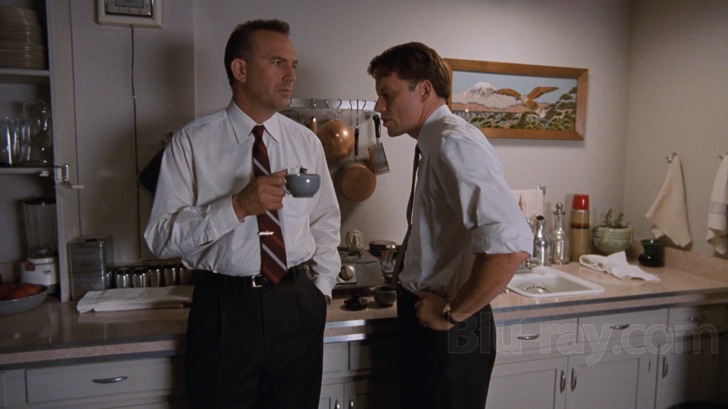
Thirteen Days was well reviewed but was not nearly the box office success that New Line had hoped. It had the bad luck to be released just after the resolution of the contested 2000 presidential election between George W. Bush and Al Gore, which had dominated the news cycle for weeks. In that atmosphere of political exhaustion, a film set in the White House was a tough sell, no matter how highly praised. But the film holds up, and Warner has provided a capable Blu-ray presentation. Highly recommended.
Similar titles
Similar titles you might also like

Bridge of Spies
2015

Free State of Jones
2016

The Right Stuff
30th Anniversary Edition
1983

Zero Dark Thirty 4K
2012

Good Night, and Good Luck.
2005

K-19: The Widowmaker 4K
Collector's Edition
2002

The Good Shepherd
2006

Killing Kennedy
2013

Munich
2005

Chernobyl 4K
2019

Selma
2014

The Company
2007

John Adams
2008

Judgment at Nuremberg
1961

World Trade Center 4K
2006

Reds
40th Anniversary Edition
1981

Sons of Liberty
2015

The Command
2018

JFK 4K
Director's Cut
1991

Turn: Washington's Spies: The Complete First Season
2014-2015